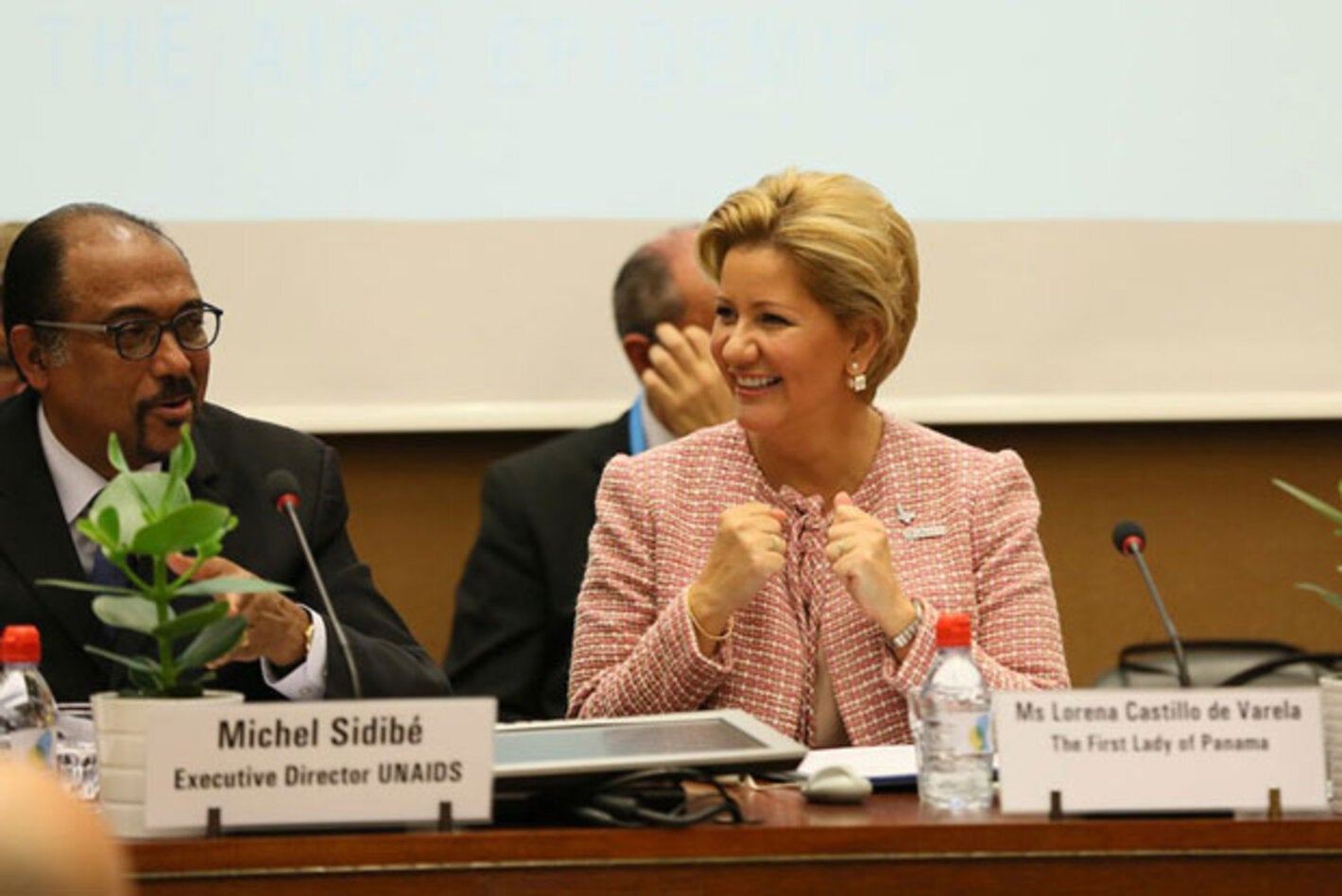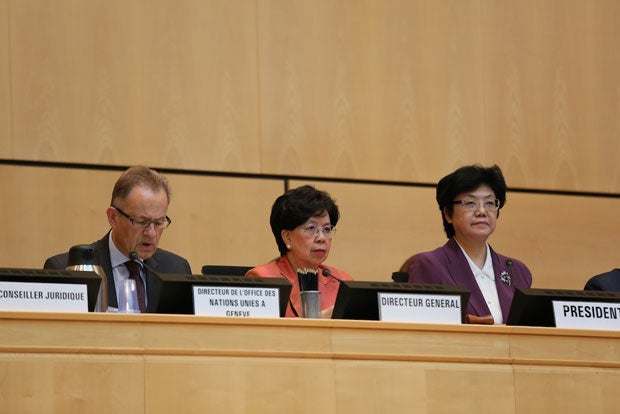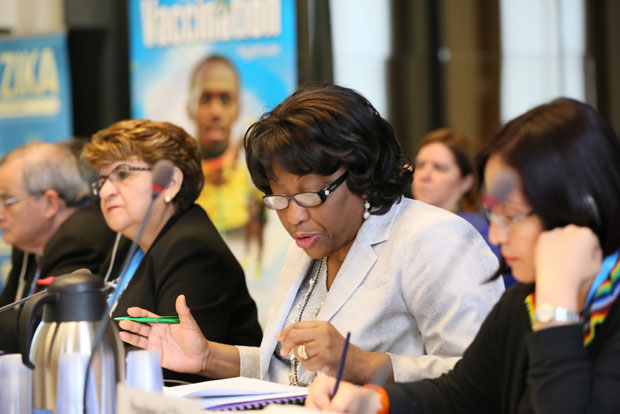
Geneva, 23 May 2016 (PAHO/WHO) - With words of celebration, warning and hope, the Director-General of the World Health Organization (WHO), Dr. Margaret Chan, opened the 69th World Health Assembly yesterday.
Dr. Chan celebrated recent progress in global public health, particularly in the fight against HIV/AIDS, tuberculosis, malaria, and polio, as well as in improving maternal and child health. But she warned that recent outbreaks of Ebola, MERS, Zika virus, and urban yellow fever signaled a "dramatic resurgence of the threat from emerging and reemerging infectious diseases", observing that "the world is not prepared to cope."

"Given what we face right now, and the next surprises that are sure to come, the item on your agenda with the most sweeping consequences, for a danger that can quickly sweep around the world, is the one on the reform of WHO's work in health emergency management", noted Dr. Chan.
The WHO Director-General also highlighted the "slow-motion" disasters of climate change, antimicrobial resistance, and the rise in noncommunicable diseases such as cancer, heart and lung disease, and diabetes.
"Unchecked, these slow-motion disasters will eventually reach a tipping point where the harm done is irreversible", she stated. The 2030 Agenda for Sustainable Development, however, aims to avert such disasters by inspiring "optimism and hope". Dr. Chan emphasized that health plays a central role in this agenda, and that universal health coverage will be key to achieving its health-related targets.
"Universal health coverage is the target that underpins all others. It is the ultimate expression of fairness that leaves no one behind", said Chan.
Region of the Americas: The new development agenda provides an opportunity to speed progress against epidemics
The 2030 Agenda for Sustainable Development provides an opportunity to speed progress made in the fight against epidemics, as well as in tackling neglected and tropical diseases, and provides a framework for responding to new threats such as Zika, noted the Minister of Health of Argentina, Jorge Lemus, in his address to the 69th World Health Assembly on behalf of the Member States of the Region of the Americas.
"The Americas saw significant progress in most health-related areas, from infant mortality to communicable diseases such as HIV, tuberculosis and malaria, but the pending agenda forces us to press on with a renewed commitment", he stated.
The minister also highlighted the efforts of the region in coping with the Zika epidemic, but admitted that the need remains to "continue to strengthen national health systems in order to prevent, detect, and respond to outbreaks and other public health emergencies." Lemus called on WHO to continue to assist countries in their response to Zika and other epidemics, as well as in the research and development of a vaccine.
Countries of the Americas prepare to address topics at the Assembly
With an appeal for active discussion during the 69th World Health Assembly, the Director of the Pan American Health Organization/World Health Organization (PAHO/WHO), Dr. Carissa F. Etienne, met today with the delegations of the countries of the Americas, focusing on issues of key interest for the Region to be addressed in the plenary session.

Ministers of health and authorities of the countries of the Region met with the PAHO/WHO delegation, headed by Etienne, to review and share information on the main topics for plenary discussion. Within this context, Dr. Etienne emphasized that the reform of WHO's emergency response is a subject of particular interest for the Region.
The previous day, Dr. Etienne presented to the UNASUR delegations an analysis on the response to emergencies in the Americas, highlighting that the region has broad experience in responding to emergencies and emerging outbreaks, and that countries have used the lessons learned to improve their response systems.
Events
HIV/AIDS, dengue, child obesity, noncommunicable diseases, physical activity, universal health, aging, cancer, and the Sustainable Development Goals are some of the topics that will be addressed in more than 20 side events organized by the countries of the Americas, starting 23 May:
HIV: ensuring access of women and adolescent girls to health services will be key to ending the epidemic by 2030
Delegates from several countries of the Americas and other nations attending a side event to the 69th World Health Assembly agreed that giving women and adolescent girls access to health services—including prevention, treatment, and drugs to prevent mother-to-child transmission—will be key to ending the HIV epidemic by 2030.
The high-level meeting "Women and adolescent girls on the Fast-Track to ending the AIDS epidemic" was organized by the First Lady of Panama and UNAIDS special ambassador for AIDS in Latin America, Lorena Castillo de Varela.
New President and Vice-Presidents of the World Assembly
The Health Assembly elected Ahmed bin Mohammed el-Saidi, Minister of Health of Oman, as its new president.
Panama was appointed as vice-president of the 69th World Health Assembly for the Region of the Americas. The Minister of Health of Panama, Francisco Javier Terrientes, will be one of the five vice-presidents of the plenary session, a position that corresponds to each world region of WHO.
Topics covered this week
Up to 28 May, Member State delegations will discuss a wide range of topics. These include decisions related to WHO's response to health emergencies and the International Health Regulations, as well as to noncommunicable diseases and factors that can put people at risk of these diseases, including child obesity, maternal and child nutrition, air pollution, tobacco control, violence, and road safety.
The delegates will discuss resolutions relating to human resources for health and global shortages of medicines; draft strategies for HIV, hepatitis, and sexually transmitted infections, with new targets aligned with the Sustainable Development Agenda; migration and health; and other subjects.



